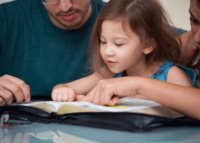How Moms Can Manage Mental Health During a Pandemic

There is no need to remind anyone that these last few weeks have been unlike anything experienced or seen in our lifetime. My work schedule has been interrupted, my husband’s work schedule has been interrupted, our social life has disappeared, and my kids are completely thrown off.
Field trips were canceled, basketball season has been delayed, and school has gone online for the foreseeable future. Dates spin in and out of my head, fighting for a return to normalcy.
Can we resume prior activities on can we resume prior activities May 18? Mid-June? 2021?
I can’t even keep track.
Accept that change is hard
The disruption and uncertainty of it all are difficult for me. Change is hard.
I can verbalize my struggles. I can digitally share about them with my friends and engage in long discussions with my husband.
However, my kids don’t know how to express their fear or anxiety as well. For them, it manifests in misbehavior, aggression, moodiness, hyperactivity, tearfulness, or even closed-off apathy.
Their response is developmentally understandable.
Understand your child’s response
As their prefrontal cortexes are still developing, it is difficult for your children to access emotions or positive decision-making while in fight-or-flight mode.
A stressful trigger, like being told they can no longer see their friends or go to school, takes a toll on their bodies. Stress hormones get ramped up and are difficult for them to process, contributing to more fear and anxiety. Chronic stress can also affect the immune system and its function.
The same is true for adults. Even though we have the luxury of developed brains, it is likewise difficult to access our frontal lobe and respond appropriately to hardship when faced with extreme stressors.
Discover the solution
So, what is the solution?
It starts with us.
If we, as parents, can learn to manage our stress and be aware of our triggers, we can teach our children proper responses. Children are so perceptive. They feed off of our emotions, whether we know it or not.
You know that old saying, “Put your own oxygen mask on first”?
During times of uncertainty, I absolutely believe that. We must put our oxygen masks on in order to best care for our children’s emotions.
Six tips for managing your mental well-being
1. Mind your use of social media.
Now more than ever, there are so many articles, opinions, and views on social media. The flood of digital content can trigger a stress and anxiety response in the body.
I have learned I need to limit my time on social media. I have pledged to stop clicking on every gloom-and-doom article. I have asked my husband to keep the news off when I am in the room and to only update me on a need-to-know basis.
These practices help me to take my thoughts captive with greater ease, which leads to the second tip for managing your mental well-being.
2. Create an awareness of unpleasant emotions.
When my mind starts racing, I can let it go into a lot of scary what-if, apocalyptic-type thought patterns. When I find my mind spiraling, I stop and take note of what is happening in my body.
- Am I feeling physically tense?
- Am I experiencing fast, shallow breathing?
- Is my chest tight?
- Does my stomach hurt?
I create a physical awareness, then I ask myself what is happening to cause my responses: Am I feeling out of control? Unsafe? Helpless? Fearful? If so, why?
What is underneath those feelings? Is there a lie I am believing?
Then, after I have created an awareness of the cause of my anxiety, I combat it with the truth of God’s word. Philippians 4 is on repeat for me right now, as is Psalm 121 and Psalm 91.
I must keep myself grounded in truth when my mind is racing.
3. Practice breathwork.
Taking deep breaths is important for my continued well-being.
When we take deep breaths through our noses and slowly let all of the air out, it helps to take us out of fight-or-flight mode. It activates our parasympathetic nervous system, God’s natural chill-pill system in our bodies.
I taught my children how to use breathwork as well. I love the 4-7-8 breathing technique: breathe in through the nose for four seconds, hold it for seven, then breathe out through the mouth for eight.
4. Get active.
As the weather allows, get outside and take a walk in the sunshine.
Sun exposure is a wonderful way to stimulate the production of vitamin D in the body. Vitamin D is excellent for immune health, mood, and improved sleep, all of which are much needed during times of fear and uncertainty.
5. Accept this extra time as a gift.
Many of us are trying to juggle work and kids at home. Maybe we are experiencing job uncertainty. There are so many unknowns.
Remind yourself that this is only temporary. These struggles won’t last forever. We can’t control the future or the outcome.
We don’t know the end date. But we do know that we are getting more time with our families than ever before. We have the opportunity to make memories that will last a lifetime.
We can enjoy baking, creating new recipes, making music, playing games, watching funny shows on TV, playing outside, and so many other activities for which we don’t always have time.
By creating a safe place of fun and joy for our kids, we can redirect the way they experience this pandemic.
6. Find rest in him
God has given us everything we need to survive this trying time.
He has given our children us as guides. My prayer is that, as parents, we can find awareness of our mental triggers and rest in him first. My hope is that, out of that rest, our kids can find peace.
“I am not saying this because I am in need, for I have learned to be content whatever the circumstances. I know what it is to be in need, and I know what it is to have plenty. I have learned the secret of being content in any and every situation, whether well fed or hungry, whether living in plenty or in want. I can do all this through him who gives me strength” (Philippians 4:11–13 ESV).









